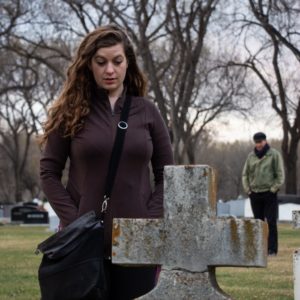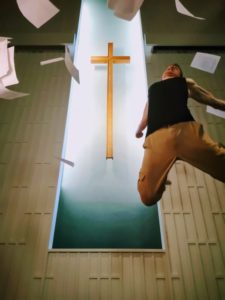Most of us can remember a vacation that’s gone horribly wrong. Flights get delayed, papers get lost—whatever it is, it’s the furthest thing from funny when it happens. In retrospect, however, the laughter often comes echoing through the cracks to make a good story.
“I’ve compiled different stories to get that comic arc,” says playwright Rod Macpherson regarding his play In Ireland We Rented a Car from Criminals, which he is bringing to this year’s Victoria Fringe Theatre Festival.
From the narrow, stone-walled streets of the Irish countryside to driving a standard with the wrong hand, all the things that tourists experience in another place, says Macpherson, can make for hilarious stories. But the play’s main character, Mary, has more trying motives that at times make the play a dark endeavour as well, which, when it comes to Irish history, is no laughing matter.
“Once you get to the famine graveyards, then that’s where you get sort of comic elements up against the very serious reality of what happened to people and how badly they were exploited,” Macpherson says.

Comedy and drama often stem from the same things, both in the original Shakespearian sense—where the only real difference between a comedy and a tragedy was the ending—and in Macpherson’s play. Illustrating the close relationship between comedy and drama, Macpherson draws on a story he heard of going out on the water to spread someone’s ashes, a situation that is, typically, far from funny.
“The example that somebody gave me,” says Macpherson, “they were out on a boat in a lake and the wind blew the deceased’s ashes back, covering everybody in the boat.”
Macpherson once decided to take a trip to Ireland after finding out he had ancestry there. But that connection was hard for him to feel, as the ancestry is so far back.
“That makes me ask,” he says, “what is the reality of that connection when you go back six generations? Is that valid?”
Playwright and actor Ryan Scramstead says that he is okay with the audience members being slightly confused at the end of his play, as art is a collaborative process. In Scramstead’s play Letters to Myself—which he calls “semi-autobiographical” and which is also going to be performed at this year’s Fringe—each voice in his head is a different character, and transparency is at the forefront of the performance, something that he says many people are afraid of.
“To be so vulnerable that you are actually talking openly about ‘I’ve got one voice that says this,’ I think we’re almost afraid to come across as schizophrenic or like we don’t have things figured out, and it’s a very vulnerable thing to admit,” says Scramstead.
But things are always changing, so it’s only natural to not always have things figured out, says Scramstead; a key in creating this play was for him to be comfortable with that.
“The openness to have that discussion can produce such strength, especially in connecting and empathizing and sympathizing with other people,” he says.
Contrary to Scramstead’s philosophy, Macpherson says that he tries to keep his own experience out of the script.
“Because you’re so invested in it personally, it never quite comes off as authentic if you use something really personal without sort of filtering it through the viewpoint of another person,” says Macpherson. “But that’s just my own way of working.”
Macpherson strives to keep himself out of the material, which he realizes is counterintuitive to a lot of writing approaches.
“People who say you’ve got to write what you know… [That] leads to a lot of confessional writing and a lot of really solid first-person narratives,” he says. “In a play, I’d rather try and inhabit three completely different people.”
The idea for Scramstead’s play came to him when he spent six months overseas in 2018 doing humanitarian work, during which time he wrote, as the play’s title suggests, letters to himself.
“What our team leader got us to do was to write these time-capsule letters to ourselves,” he says. “We wrote one at the beginning, we wrote one halfway through, and we wrote one at the end, and then we would receive them three months later as this time capsule.”
When Scramstead received all three, he realized some commonalities: he frequently used imagery to describe an unintentional arc—wandering through tall grass to try to make sense of the voices, for example. So he started writing, using the letters as bookends for the script.
“The letters are very much a reflection within the show,” says Scramstead. “The pivotal moments are when these letters appear on stage, and in the show, I have no idea where they’re coming from.”
Some of the voices in Scramstead’s head are represented through pre-recorded audio that plays during the show, while other voices are given to other characters. Scramstead says that as an actor, it’s important to have a community to help make sense of the many voices actors portray, but that at the end of the day, you are always playing an element of yourself.
“I’ve seen and heard stories of actors who have just stepped away from it because they didn’t like different things they were exploring,” he says, “but it’s not a matter of ‘I don’t like this so I’m gonna go hide it,’ it’s a matter of ‘Okay, this is in me. But I think this is also in everyone.’ It can be dangerous, but it’s a matter of understanding that it’s really things that we all deal with.”
Victoria Fringe Theatre Festival
Wednesday, August 21 until September 1
Various times, locations, and prices
intrepridtheatre.com

